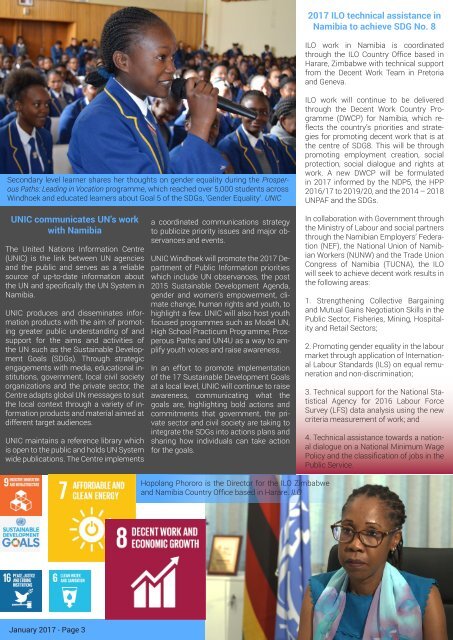UN Namibia
2ktDYIo
2ktDYIo
You also want an ePaper? Increase the reach of your titles
YUMPU automatically turns print PDFs into web optimized ePapers that Google loves.
2017 ILO technical assistance in<br />
<strong>Namibia</strong> to achieve SDG No. 8<br />
ILO work in <strong>Namibia</strong> is coordinated<br />
through the ILO Country Office based in<br />
Harare, Zimbabwe with technical support<br />
from the Decent Work Team in Pretoria<br />
and Geneva.<br />
Secondary level learner shares her thoughts on gender equality during the Prosperous<br />
Paths: Leading in Vocation programme, which reached over 5,000 students across<br />
Windhoek and educated learners about Goal 5 of the SDGs, ‘Gender Equality’. <strong>UN</strong>IC<br />
ILO work will continue to be delivered<br />
through the Decent Work Country Programme<br />
(DWCP) for <strong>Namibia</strong>, which reflects<br />
the country’s priorities and strategies<br />
for promoting decent work that is at<br />
the centre of SDG8. This will be through<br />
promoting employment creation, social<br />
protection, social dialogue and rights at<br />
work. A new DWCP will be formulated<br />
in 2017 informed by the NDP5, the HPP<br />
2016/17 to 2019/20, and the 2014 – 2018<br />
<strong>UN</strong>PAF and the SDGs.<br />
<strong>UN</strong>IC communicates <strong>UN</strong>’s work<br />
with <strong>Namibia</strong><br />
The United Nations Information Centre<br />
(<strong>UN</strong>IC) is the link between <strong>UN</strong> agencies<br />
and the public and serves as a reliable<br />
source of up-to-date information about<br />
the <strong>UN</strong> and specifically the <strong>UN</strong> System in<br />
<strong>Namibia</strong>.<br />
<strong>UN</strong>IC produces and disseminates information<br />
products with the aim of promoting<br />
greater public understanding of and<br />
support for the aims and activities of<br />
the <strong>UN</strong> such as the Sustainable Development<br />
Goals (SDGs). Through strategic<br />
engagements with media, educational institutions,<br />
government, local civil society<br />
organizations and the private sector, the<br />
Centre adapts global <strong>UN</strong> messages to suit<br />
the local context through a variety of information<br />
products and material aimed at<br />
different target audiences.<br />
<strong>UN</strong>IC maintains a reference library which<br />
is open to the public and holds <strong>UN</strong> System<br />
wide publications. The Centre implements<br />
a coordinated communications strategy<br />
to publicize priority issues and major observances<br />
and events.<br />
<strong>UN</strong>IC Windhoek will promote the 2017 Department<br />
of Public Information priorities<br />
which include <strong>UN</strong> observances, the post<br />
2015 Sustainable Development Agenda,<br />
gender and women’s empowerment, climate<br />
change, human rights and youth, to<br />
highlight a few. <strong>UN</strong>IC will also host youth<br />
focused programmes such as Model <strong>UN</strong>,<br />
High School Practicum Programme, Prosperous<br />
Paths and <strong>UN</strong>4U as a way to amplify<br />
youth voices and raise awareness.<br />
In an effort to promote implementation<br />
of the 17 Sustainable Development Goals<br />
at a local level, <strong>UN</strong>IC will continue to raise<br />
awareness, communicating what the<br />
goals are, highlighting bold actions and<br />
commitments that government, the private<br />
sector and civil society are taking to<br />
integrate the SDGs into actions plans and<br />
sharing how individuals can take action<br />
for the goals.<br />
In collaboration with Government through<br />
the Ministry of Labour and social partners<br />
through the <strong>Namibia</strong>n Employers’ Federation<br />
(NEF), the National Union of <strong>Namibia</strong>n<br />
Workers (N<strong>UN</strong>W) and the Trade Union<br />
Congress of <strong>Namibia</strong> (TUCNA), the ILO<br />
will seek to achieve decent work results in<br />
the following areas:<br />
1. Strengthening Collective Bargaining<br />
and Mutual Gains Negotiation Skills in the<br />
Public Sector, Fisheries, Mining, Hospitality<br />
and Retail Sectors;<br />
2. Promoting gender equality in the labour<br />
market through application of International<br />
Labour Standards (ILS) on equal remuneration<br />
and non-discrimination;<br />
3. Technical support for the National Statistical<br />
Agency for 2016 Labour Force<br />
Survey (LFS) data analysis using the new<br />
criteria measurement of work; and<br />
4. Technical assistance towards a national<br />
dialogue on a National Minimum Wage<br />
Policy and the classification of jobs in the<br />
Public Service.<br />
Hopolang Phororo is the Director for the ILO Zimbabwe<br />
and <strong>Namibia</strong> Country Office based in Harare. ILO<br />
January 2017 - Page 3


